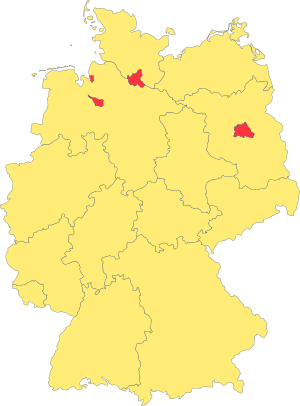Germany
Federal Republic of Germany Bundesrepublik Deutschland (German) | |
|---|---|
| Anthem: " | |
Location of Germany (dark green) – in Europe (light green & dark grey) | |
| Capital and largest city | Berlin[b] 52°31′N 13°23′E / 52.517°N 13.383°E |
| Official languages | German[c] |
| Demonym(s) | German |
| Government | Federal parliamentary republic[4] |
| Frank-Walter Steinmeier | |
| Olaf Scholz | |
| Legislature | Bundestag, Bundesrat[d] |
| Area | |
• Total | 357,600 km2 (138,100 sq mi)[5] (63rd) |
• Water (%) | 1.27[6] |
| Population | |
• Q3 2023 estimate | |
• Density | 236/km2 (611.2/sq mi) (58th) |
| GDP (PPP) | 2024 estimate |
• Total | |
• Per capita | |
| GDP (nominal) | 2024 estimate |
• Total | |
• Per capita | |
| Gini (2022) | low |
| HDI (2022) | very high (7th) |
| Currency | Euro (€) (EUR) |
| Time zone | UTC+1 (CET) |
• Summer (DST) | UTC+2 (CEST) |
| Date format |
|
| Driving side | right |
| Calling code | +49 |
| ISO 3166 code | DE |
| Internet TLD | .de |
Germany,[e] officially the Federal Republic of Germany,[f] is a country in the western region of Central Europe. It is the second-most populous country in Europe after Russia,[g] and the most populous member state of the European Union. Germany lies between the Baltic and North Sea to the north and the Alps to the south. Its 16 constituent states have a total population of over 84 million, covering a combined area of 357,600 km2 (138,100 sq mi) and sharing land borders with Denmark to the north, Poland and the Czech Republic to the east, Austria and Switzerland to the south, and France, Luxembourg, Belgium, and the Netherlands to the west. The nation's capital and most populous city is Berlin and its main financial centre is Frankfurt; the largest urban area is the Ruhr.
Settlement in what is now Germany began in the Lower Paleolithic, with various tribes inhabiting it from the Neolithic onward, chiefly the Celts. Various Germanic tribes have inhabited the northern parts of modern Germany since classical antiquity. A region named Germania was documented before AD 100. In 962, the Kingdom of Germany formed the bulk of the Holy Roman Empire. During the 16th century, northern German regions became the centre of the Protestant Reformation. Following the Napoleonic Wars and the dissolution of the Holy Roman Empire in 1806, the German Confederation was formed in 1815.
Formal unification of Germany into the modern nation-state commenced on 18 August 1866 with the North German Confederation Treaty establishing the Prussia-led North German Confederation later transformed in 1871 into the German Empire. After World War I and the German Revolution of 1918–1919, the Empire was in turn transformed into the semi-presidential Weimar Republic. The Nazi seizure of power in 1933 led to the establishment of a totalitarian dictatorship, World War II, and the Holocaust. After the end of World War II in Europe and a period of Allied occupation, in 1949, Germany as a whole was organized into two separate polities with limited sovereignty: the Federal Republic of Germany, generally known as West Germany, and the German Democratic Republic, known as East Germany, while Berlin continued its de jure Four Power status. The Federal Republic of Germany was a founding member of the European Economic Community and the European Union, while the German Democratic Republic was a communist Eastern Bloc state and member of the Warsaw Pact. After the fall of the communist led-government in East Germany, German reunification saw the former East German states join the Federal Republic of Germany on 3 October 1990.
Germany has been described as a great power with a strong economy; it has the largest economy in Europe. As a global power in industrial, scientific and technological sectors, it is both the world's third-largest exporter and importer. As a developed country it offers social security, a universal health care system, and tuition-free university education. Germany is a member of the United Nations, European Union, NATO, Council of Europe, G7, G20, and OECD. It has the third-greatest number of UNESCO World Heritage Sites.
Etymology
The English word Germany derives from the Latin Germania, which came into use after Julius Caesar adopted it for the peoples east of the Rhine.[12] The German term Deutschland, originally diutisciu land ('the German lands') is derived from deutsch (cf. Dutch), descended from Old High German diutisc 'of the people' (from diot or diota 'people'), originally used to distinguish the language of the common people from Latin and its Romance descendants. This in turn descends from Proto-Germanic *þiudiskaz 'of the people' (see also the Latinised form Theodiscus), derived from *þeudō, descended from Proto-Indo-European *tewtéh₂- 'people', from which the word Teutons also originates.[13]
History
Prehistory
Pre-human ancestors, the
Germanic tribes, Roman frontier and the Frankish Empire

The
Under
Around 260, Germanic peoples broke into Roman-controlled lands.
East Francia and the Holy Roman Empire
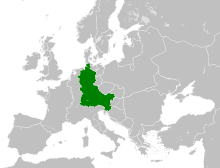

Under the
Johannes Gutenberg introduced moveable-type printing to Europe, laying the basis for the democratization of knowledge.[37] In 1517, Martin Luther incited the Protestant Reformation and his translation of the Bible began the standardization of the language; the 1555 Peace of Augsburg tolerated the "Evangelical" faith (Lutheranism), but also decreed that the faith of the prince was to be the faith of his subjects (cuius regio, eius religio).[38] From the Cologne War through the Thirty Years' Wars (1618–1648), religious conflict devastated German lands and significantly reduced the population.[39][40]
The
From 1740,
German Confederation and Empire

Following the fall of Napoleon, the Congress of Vienna founded the German Confederation, a loose league of 39 sovereign states. The appointment of the emperor of Austria as the permanent president reflected the Congress's rejection of Prussia's rising influence. Disagreement within restoration politics partly led to the rise of liberal movements, followed by new measures of repression by Austrian statesman Klemens von Metternich.[48][49] The Zollverein, a tariff union, furthered economic unity.[50] In light of revolutionary movements in Europe, intellectuals and commoners started the revolutions of 1848 in the German states, raising the German question. King Frederick William IV of Prussia was offered the title of emperor, but with a loss of power; he rejected the crown and the proposed constitution, a temporary setback for the movement.[51]
King William I appointed Otto von Bismarck as the Minister President of Prussia in 1862. Bismarck successfully concluded the war with Denmark in 1864; the subsequent decisive Prussian victory in the Austro-Prussian War of 1866 enabled him to create the North German Confederation which excluded Austria. After the defeat of France in the Franco-Prussian War, the German princes proclaimed the founding of the German Empire in 1871. Prussia was the dominant constituent state of the new empire; the King of Prussia ruled as its Kaiser, and Berlin became its capital.[52][53]
In the
Weimar Republic and Nazi Germany
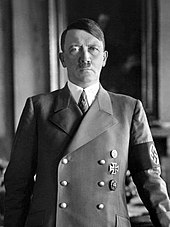

On 11 August 1919, President
The worldwide
In 1935, the regime withdrew from the Treaty of Versailles and introduced the
In August 1939,
In what later became known as
East and West Germany

After Nazi Germany surrendered, the Allies de jure abolished the German state and partitioned Berlin and Germany's remaining territory into four occupation zones. The western sectors, controlled by France, the United Kingdom, and the United States, were merged on 23 May 1949 to form the Federal Republic of Germany (German: Bundesrepublik Deutschland); on 7 October 1949, the Soviet Zone became the German Democratic Republic (GDR) (German: Deutsche Demokratische Republik; DDR). They were informally known as West Germany and East Germany.[91] East Germany selected East Berlin as its capital, while West Germany chose Bonn as a provisional capital, to emphasise its stance that the two-state solution was temporary.[92]
West Germany was established as a federal parliamentary republic with a "
East Germany was an Eastern Bloc state under political and military control by the Soviet Union via occupation forces and the Warsaw Pact. Although East Germany claimed to be a democracy, political power was exercised solely by leading members (Politbüro) of the communist-controlled Socialist Unity Party of Germany, supported by the Stasi, an immense secret service.[97] While East German propaganda was based on the benefits of the GDR's social programmes and the alleged threat of a West German invasion, many of its citizens looked to the West for freedom and prosperity.[98] The Berlin Wall, built in 1961, prevented East German citizens from escaping to West Germany, becoming a symbol of the Cold War.[99]
Tensions between East and West Germany were reduced in the late 1960s by Chancellor
Reunified Germany and the European Union
United Germany was considered the enlarged continuation of
Since reunification, Germany has taken a more active role in the
In the
Geography

Germany is the seventh-largest country in Europe;[4] bordering Denmark to the north, Poland and the Czech Republic to the east, Austria to the southeast, and Switzerland to the south-southwest. France, Luxembourg and Belgium are situated to the west, with the Netherlands to the northwest. Germany is also bordered by the North Sea and, at the north-northeast, by the Baltic Sea. German territory covers 357,022 km2 (137,847 sq mi), consisting of 348,672 km2 (134,623 sq mi) of land and 8,350 km2 (3,224 sq mi) of water.
Elevation ranges from the mountains of the Alps (highest point: the Zugspitze at 2,963 metres or 9,721 feet) in the south to the shores of the North Sea (Nordsee) in the northwest and the Baltic Sea (Ostsee) in the northeast. The forested uplands of central Germany and the lowlands of northern Germany (lowest point: in the municipality Neuendorf-Sachsenbande, Wilstermarsch at 3.54 metres or 11.6 feet below sea level[114]) are traversed by such major rivers as the Rhine, Danube and Elbe. Significant natural resources include iron ore, coal, potash, timber, lignite, uranium, copper, natural gas, salt, and nickel.[4]
Climate
Most of Germany has a
From February 2019 – 2020, average monthly temperatures in Germany ranged from a low of 3.3 °C (37.9 °F) in January 2020 to a high of 19.8 °C (67.6 °F) in June 2019.[116] Average monthly precipitation ranged from 30 litres per square metre in February and April 2019 to 125 litres per square metre in February 2020.[117] Average monthly hours of sunshine ranged from 45 in November 2019 to 300 in June 2019.[118]
Biodiversity
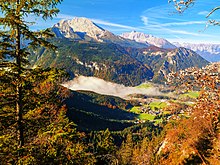
The territory of Germany can be divided into five terrestrial ecoregions: Atlantic mixed forests, Baltic mixed forests, Central European mixed forests, Western European broadleaf forests, and Alps conifer and mixed forests.[119] As of 2016[update] 51% of Germany's land area is devoted to agriculture, while 30% is forested and 14% is covered by settlements or infrastructure.[120]
Plants and animals include those generally common to Central Europe. According to the National Forest Inventory,
The
Politics
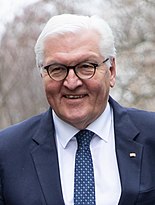 |
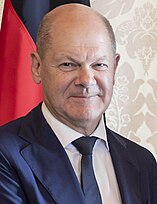
|
| Frank-Walter Steinmeier President (representative head of state) |
Olaf Scholz Chancellor (head of government) |
Germany is a
The
Since 1949, the party system has been dominated by the
Constituent states
Germany is a
|
Law
Germany has a
Criminal and private laws are codified on the national level in the
As of 2016, Germany's murder rate stood at a low of 1.18 murders per 100,000.[145] In 2018, the overall crime rate fell to its lowest since 1992.[146]
Same-sex marriage has been legal in Germany since 2017, and LGBT rights are generally protected in the nation.[147]
Foreign relations
Germany has a network of 227 diplomatic missions abroad
Germany's development policy functions as a distinct sector within its foreign policy framework. It is formulated by the Federal Ministry for Economic Cooperation and Development and carried out by the implementing organisations. The German government sees development policy as a joint responsibility of the international community.[157] It was the world's second-biggest aid donor in 2019 after the United States.[158]
Military

Germany's military, the Bundeswehr (Federal Defence), is organised into the
As of January 2020[update], the Bundeswehr has a strength of 184,001 active soldiers and 80,947 civilians.[164] Reservists are available to the armed forces and participate in defence exercises and deployments abroad.[165] Until 2011, military service was compulsory for men at age 18, but this has been officially suspended and replaced with a voluntary service.[166][167] Since 2001 women may serve in all functions of service without restriction.[168] According to the Stockholm International Peace Research Institute, Germany was the fourth-largest exporter of major arms in the world from 2014 to 2018.[169]
In peacetime, the Bundeswehr is commanded by the Minister of Defence. In
Economy
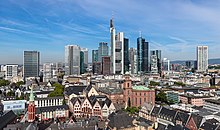
Germany has a
Germany is part of the European single market which represents more than 450 million consumers.[180] In 2017, the country accounted for 28% of the eurozone economy according to the International Monetary Fund.[181] Germany introduced the common European currency, the euro, in 2002.[182] Its monetary policy is set by the European Central Bank, which is headquartered in Frankfurt.[183][173]
The automotive industry in Germany is regarded as one of the most competitive and innovative in the world,[184] and is the sixth-largest by production as of 2021. Germany is home to Volkswagen Group, the world's second-largest automotive manufacturer in 2022 by vehicle production,[185] and is the third-largest exporter of cars as of 2023.[186]
The top ten exports of Germany are vehicles, machinery, chemical goods, electronic products, electrical equipments, pharmaceuticals, transport equipments, basic metals, food products, and rubber and plastics.[187]
Of the world's 500 largest stock-market-listed companies measured by revenue in 2023, the
Infrastructure
With its central position in Europe, Germany is a transport hub for the continent.
In 2019[update], Germany was the world's seventh-largest consumer of energy.
Tourism

Domestic and international travel and tourism combined directly contribute over €105.3 billion to German GDP. Including indirect and induced impacts, the industry supports 4.2 million jobs.
Demographics
With a population of 80.2 million according to the

Four sizeable groups of people are referred to as national minorities because their ancestors have lived in their respective regions for centuries:
After the United States, Germany is the second-most popular
Germany has a number of large cities. There are 11 officially recognised metropolitan regions. The country's largest city is Berlin, while its largest urban area is the Ruhr.[231]
| Rank | Name
|
State | Pop. | Rank | Name
|
State | Pop. | ||
|---|---|---|---|---|---|---|---|---|---|
| 1 | Berlin | Berlin | 3,644,826 | 11 | Bremen | Bremen | 569,352 | ||
| 2 | Hamburg | Hamburg | 1,841,179 | 12 | Dresden | Saxony | 554,649 | ||
| 3 | Munich | Bavaria | 1,471,508 | 13 | Hanover | Lower Saxony | 538,068 | ||
| 4 | Cologne | North Rhine-Westphalia | 1,085,664 | 14 | Nuremberg | Bavaria | 518,365 | ||
| 5 | Frankfurt | Hesse | 753,056 | 15 | Duisburg | North Rhine-Westphalia | 498,590 | ||
| 6 | Stuttgart | Baden-Württemberg | 634,830 | 16 | Bochum | North Rhine-Westphalia | 364,628 | ||
| 7 | Düsseldorf | North Rhine-Westphalia | 619,294 | 17 | Wuppertal | North Rhine-Westphalia | 354,382 | ||
| 8 | Leipzig | Saxony | 587,857 | 18 | Bielefeld | North Rhine-Westphalia | 333,786 | ||
| 9 | Dortmund | North Rhine-Westphalia | 587,010 | 19 | Bonn | North Rhine-Westphalia | 327,258 | ||
| 10 | Essen | North Rhine-Westphalia | 583,109 | 20 | Münster | North Rhine-Westphalia | 314,319 | ||
Religion
According to the 2011 census, Christianity was the largest religion in Germany, with 66.8% of respondents identifying as Christian, of which 3.8% were not church members.
In the 2011 census, 1.9% of respondents (1.52 million people) gave their religion as Islam, but this figure is deemed unreliable because a disproportionate number of adherents of this faith (and other religions, such as Judaism) are likely to have made use of their right not to answer the question.
In 2011, formal members of the Jewish community represented no more than 0.2% of the total German population, and 60% of them resided in Berlin.[237] An estimated 80 to 90 percent of these Jews in Germany are Russian-speaking immigrants from the former Soviet Union, who came to Germany from the 1980s onwards.[238][239]
A study in 2018 estimated that 38% of the population are not members of any religious organization or denomination,[240] though up to a third may still consider themselves religious. Irreligion in Germany is strongest in the former East Germany, which used to be predominantly Protestant before the enforcement of state atheism, and in major metropolitan areas.[241][242]
Languages
German is the official and predominantly spoken language in Germany.[243] It is one of 24 official and working languages of the European Union, and one of the three procedural languages of the European Commission.[244] German is the most widely spoken first language in the European Union, with around 100 million native speakers.[245]
Recognised native minority languages in Germany are
Education
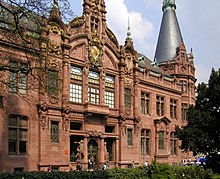
Responsibility for educational supervision in Germany is primarily organised within the individual
Most of the German universities are public institutions, and students traditionally study without fee payment.[249] The general requirement for attending university is the Abitur. According to an OECD report in 2014, Germany is the world's third leading destination for international study.[250] The established universities in Germany include some of the oldest in the world, with Heidelberg University (established in 1386), Leipzig University (established in 1409) and the University of Rostock (established in 1419) being the oldest.[251] The Humboldt University of Berlin, founded in 1810 by the liberal educational reformer Wilhelm von Humboldt, became the academic model for many Western universities.[252][253] In the contemporary era Germany has developed eleven Universities of Excellence.
Health

Germany's system of hospitals, called Krankenhäuser, dates from medieval times, and today, Germany has the world's oldest
Germany ranked 21st in the world in 2019 in life expectancy with
Culture
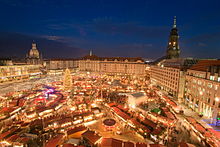
Culture in German states has been shaped by major intellectual and popular currents in Europe, both religious and secular, and its scientists, writers and philosophers have played a significant role in the development of Western thought.[260] A global opinion poll for the BBC revealed that Germany is recognised for having the most positive influence in the world in 2013 and 2014.[261][262]
Germany is well known for such folk festival traditions as the
Music

German
As of 2013, Germany was the second-largest music market in Europe, and
Art, design and architecture
German painters have influenced
German designers became early leaders of modern product design.[272] The Berlin Fashion Week and the fashion trade fair Bread & Butter are held twice a year.[273]
Architectural contributions from Germany include the
Literature and philosophy
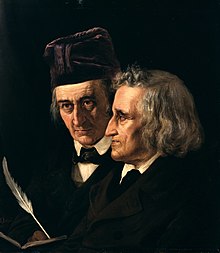
German literature can be traced back to the Middle Ages and the works of writers such as Walther von der Vogelweide and Wolfram von Eschenbach. Well-known German authors include Johann Wolfgang von Goethe, Friedrich Schiller, Gotthold Ephraim Lessing and Theodor Fontane. The collections of folk tales published by the Brothers Grimm popularised German folklore on an international level.[277] The Grimms also gathered and codified regional variants of the German language, grounding their work in historical principles; their Deutsches Wörterbuch, or German Dictionary, sometimes called the Grimm dictionary, was begun in 1838 and the first volumes published in 1854.[278]
Influential authors of the 20th century include Gerhart Hauptmann, Thomas Mann, Hermann Hesse, Heinrich Böll, and Günter Grass.[279] The German book market is the third-largest in the world, after the United States and China.[280] The Frankfurt Book Fair is the most important in the world for international deals and trading, with a tradition spanning over 500 years.[281] The Leipzig Book Fair also retains a major position in Europe.[282]
German philosophy is historically significant:
Media
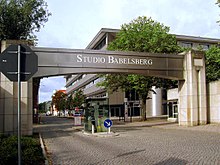
The largest internationally operating
German cinema has made major technical and artistic contributions to film. The first works of the
The
Cuisine
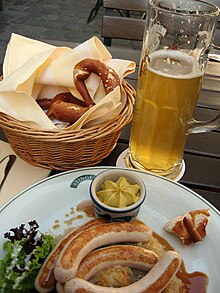
German cuisine varies from region to region and often neighbouring regions share some culinary similarities, including with the southern regions of
are popular.Bread is a significant part of German cuisine and German bakeries produce about 600 main types of bread and 1,200 types of pastries and rolls (Brötchen).[290] German cheeses account for about 22% of all cheese produced in Europe.[291] In 2012 over 99% of all meat produced in Germany was either pork, chicken or beef. Germans produce their ubiquitous sausages in almost 1,500 varieties, including Bratwursts and Weisswursts.[292]
The national alcoholic drink is
The 2018
Sports

Football is the most popular sport in Germany. With more than 7 million official members, the German Football Association (Deutscher Fußball-Bund) is the largest single-sport organisation worldwide,[299] and the German top league, the Bundesliga, attracts the second-highest average attendance of all professional sports leagues in the world.[300] The German men's national football team won the FIFA World Cup in 1954, 1974, 1990, and 2014,[301] the UEFA European Championship in 1972, 1980 and 1996,[302] and the FIFA Confederations Cup in 2017.[303]
Germany is one of the leading
See also
Notes
- ^ From 1952 to 1990, the entire "Das Lied der Deutschen" was the national anthem, but only the third verse was sung on official occasions. Since 1991, the third verse alone has been the national anthem.[1]
- ^ Berlin is the sole constitutional capital and de jure seat of government, but the former provisional capital of the Federal Republic of Germany, Bonn, has the special title of "federal city" (Bundesstadt) and is the primary seat of six ministries.[2]
- ^ Danish, Low German, Sorbian, Romani, and Frisian are recognised by the European Charter for Regional or Minority Languages.[3]
- ^ The Bundesrat is sometimes referred to as an upper chamber of the German legislature. This is technically incorrect, since the German Constitution defines the Bundestag and Bundesrat as two separate legislative institutions. Hence, the federal legislature of Germany consists of two unicameral legislative institutions, not one bicameral parliament.
- ^ German: Deutschland, German: [ˈdɔʏtʃlant] ⓘ
- ^ German: Bundesrepublik Deutschland, German: [ˈbʊndəsʁepuˌbliːk ˈdɔʏtʃlant] ⓘ[11]
- ^ Excluding Turkey
- ^ Excluding Turkey
References
- ^ "Repräsentation und Integration" (in German). Bundespräsidialamt. Archived from the original on 7 March 2016. Retrieved 8 March 2016.
- ^ "The German Federal Government". deutschland.de. 23 January 2018. Archived from the original on 30 April 2020.
- ^ Gesley, Jenny (26 September 2018). "The Protection of Minority and Regional Languages in Germany". Library of Congress. Archived from the original on 25 May 2020.
- ^ a b c d e f g h i j k l "Germany". World Factbook. CIA. Archived from the original on 9 January 2021. Retrieved 29 March 2020.
- ^ "Flächennutzung". Archived from the original on 20 August 2023. Retrieved 20 August 2023.
- Organisation for Economic Co-operation and Development. Archivedfrom the original on 24 March 2021. Retrieved 11 October 2020.
- ^ "Population by nationality and sex (quarterly figures) [Bevölkerung nach Nationalität und Geschlecht (Quartalszahlen)]". Destatis. Archived from the original on 1 September 2020. Retrieved 5 January 2024.
- ^ a b c d "World Economic Outlook Database, April 2024 Edition. (Germany)". www.imf.org. International Monetary Fund. 16 April 2024. Retrieved 16 April 2024.
- ^ "Gini coefficient of equivalised disposable income". Eurostat. Archived from the original on 9 October 2020. Retrieved 25 November 2023.
- ^ "Human Development Report 2023/24" (PDF). United Nations Development Programme. 13 March 2024. Archived (PDF) from the original on 13 March 2024.
- ISBN 978-3-411-04066-7.
- ISBN 978-0-674-80688-7.
- ISBN 978-3-525-20768-0. Archivedfrom the original on 16 September 2015. (for diot).
- ^ McRae, Mike (6 November 2019). "We Just Found an 11-Million-Year-Old Ancestor That Hints How Humans Began to Walk". ScienceAlert. Archived from the original on 7 May 2022.
- PMID 21041630.
- ^ Hendry, Lisa (5 May 2018). "Who were the Neanderthals?". Natural History Museum. Archived from the original on 30 March 2020.
- ^ "Earliest music instruments found". BBC News. 25 May 2012. Archived from the original on 3 September 2017.
- ^ "Ice Age Lion Man is world's earliest figurative sculpture". The Art Newspaper. 31 January 2013. Archived from the original on 15 February 2015.
- from the original on 12 February 2020. Retrieved 12 March 2020.
- ^ "Nebra Sky Disc". UNESCO. 2013. Archived from the original on 11 October 2014.
- Encyclopædia Britannica Online. Archivedfrom the original on 31 March 2019. Retrieved 21 November 2020.
- ^ "Germanic Tribes (Teutons)". History Files. Archived from the original on 26 April 2020. Retrieved 16 March 2020.
- ISBN 978-0-8147-1381-5.
- ISBN 978-0-393-35203-0.
- ^ Murdoch 2004, p. 57.
- ^ a b Fulbrook 1991, pp. 9–13.
- ^ Modi, J. J. (1916). "The Ancient Germans: Their History, Constitution, Religion, Manners and Customs". The Journal of the Anthropological Society of Bombay. 10 (7): 647.
Raetia (modern Bavaria and the adjoining country)
- ISBN 978-0-521-26430-3. Archivedfrom the original on 23 December 2016.
- ISBN 978-0-521-30199-2.
- ^ a b Fulbrook 1991, p. 11.
- ISBN 978-0-429-89969-0.
- ^ McBrien, Richard (2000). Lives of the Popes: The Pontiffs from St. Peter to Benedict XVI. HarperCollins. p. 138.
- ^ Fulbrook 1991, pp. 19–20.
- ^ Fulbrook 1991, pp. 13–24.
- ^ Nelson, Lynn Harry. The Great Famine (1315–1317) and the Black Death (1346–1351). University of Kansas. Archived from the original on 29 April 2011. Retrieved 19 March 2011.
- ^ Fulbrook 1991, p. 27.
- ISBN 978-0-521-29955-8.
- ^ Cantoni, Davide (2011). "Adopting a New Religion: The Case of Protestantism in 16th Century Germany" (PDF). Barcelona GSE Working Paper Series. Archived (PDF) from the original on 9 August 2017. Retrieved 17 March 2020.
- ^ S2CID 40773221.
- ISBN 978-0-631-18117-0.
- ^ For a general discussion of the impact of the Reformation on the Holy Roman Empire, see Holborn, Hajo (1959). A History of Modern Germany, The Reformation. Princeton University Press. pp. 123–248.
- ISBN 978-90-04-24951-6.
- ISBN 978-1-139-46377-5.
- ^ "Maria Theresa, Holy Roman Empress and Queen of Hungary and Bohemia". British Museum. Archived from the original on 20 June 2021. Retrieved 15 March 2020.
- ^ Bideleux, Robert; Jeffries, Ian (1998). A History of Eastern Europe: Crisis and Change. Routledge. p. 156.
- ^ Batt, Judy; Wolczuk, Kataryna (2002). Region, State and Identity in Central and Eastern Europe. Routledge. p. 153.
- ^ Fulbrook 1991, p. 97.
- ISBN 978-1-4443-9072-8.
- ISBN 978-1-134-21088-6.
- .
- JSTOR 40963126.
- ^ "Issues Relevant to U.S. Foreign Diplomacy: Unification of German States". US Department of State Office of the Historian. Archived from the original on 1 October 2019. Retrieved 18 March 2020.
- ^ a b "Otto von Bismarck (1815–1898)". BBC. Archived from the original on 27 November 2019. Retrieved 18 March 2020.
- S2CID 154177053.
- ^ Fulbrook 1991, pp. 135, 149.
- ISBN 978-1-4027-2885-3.
- ^ Farley, Robert (17 October 2014). "How Imperial Germany Lost Asia". The Diplomat. Archived from the original on 19 March 2020.
- ISBN 978-0-571-23141-6.
- ^ a b Michael Bazyler (2016). Holocaust, Genocide, and the Law: A Quest for Justice in a Post-Holocaust World. Oxford University Press. pp. 169–70.
- ^ Crossland, David (22 January 2008). "Last German World War I veteran believed to have died". Spiegel Online. Archived from the original on 8 October 2012.
- ISBN 978-0-521-62132-8.
- ^ "GERMAN TERRITORIAL LOSSES, TREATY OF VERSAILLES, 1919". United States Holocaust Memorial Museum. Archived from the original on 4 July 2016. Retrieved 11 June 2016.
- ^ Fulbrook 1991, pp. 156–160.
- ISBN 978-1-349-21337-5.
- S2CID 155602870.
- ISBN 978-0-415-34441-8.
- ^ "PROLOGUE: Roots of the Holocaust". The Holocaust Chronicle. Archived from the original on 1 January 2015. Retrieved 28 September 2014.
- ^ Fulbrook 1991, pp. 155–158, 172–177.
- ISBN 978-0-14-303469-8.
- ^ "Ein Konzentrationslager für politische Gefangene in der Nähe von Dachau". Münchner Neueste Nachrichten (in German). 21 March 1933. Archived from the original on 10 May 2000.
- ^ von Lüpke-Schwarz, Marc (23 March 2013). "The law that 'enabled' Hitler's dictatorship". Deutsche Welle. Archived from the original on 27 April 2020.
- ^ "Industrie und Wirtschaft" (in German). Deutsches Historisches Museum. Archived from the original on 30 April 2011. Retrieved 25 March 2011.
- ISBN 978-0-14-303790-3.
- ^ Bradsher, Greg (2010). "The Nuremberg Laws". Prologue. Archived from the original on 25 April 2020. Retrieved 20 March 2020.
- ^ Fulbrook 1991, pp. 188–189.
- ^ "Descent into War". National Archives. Archived from the original on 20 March 2020. Retrieved 19 March 2020.
- ^ "The "Night of Broken Glass"". United States Holocaust Memorial Museum. Archived from the original on 11 February 2017. Retrieved 8 February 2017.
- ^ "German-Soviet Pact". United States Holocaust Memorial Museum. Archived from the original on 11 March 2020. Retrieved 19 March 2020.
- ^ a b Fulbrook 1991, pp. 190–195.
- ISBN 978-0-521-53120-7.
- ^ "World War II: Key Dates". United States Holocaust Memorial Museum. Archived from the original on 11 March 2020. Retrieved 19 March 2020.
- ^ ISBN 978-0-521-56521-9.
- ^ Overy, Richard (17 February 2011). "Nuremberg: Nazis on Trial". BBC. Archived from the original on 16 March 2011.
- ISBN 978-0-231-11200-0.
- ^ Polska 1939–1945: Straty osobowe i ofiary represji pod dwiema okupacjami. Institute of National Remembrance. 2009. p. 9.
- PMID 12288331.
- ISBN 978-3-486-56531-7.
- ^ Kershaw, Ian (2011). The End; Germany 1944–45. Allen Lane. p. 279.
- ISBN 978-1-107-02073-3. Archivedfrom the original on 1 December 2016.
- S2CID 162858499.
- .
- ISBN 978-1-56898-134-5.
- ISBN 978-0-521-49964-4.
- ^ Bührer, Werner (24 December 2002). "Deutschland in den 50er Jahren: Wirtschaft in beiden deutschen Staaten" [Economy in both German states]. Bundeszentrale für politische Bildung. Archived from the original on 1 December 2017.
- ISBN 978-1-118-77613-1.
- ^ "Rearmament and the European Defense Community". Library of Congress Country Studies. Archived from the original on 11 October 2011. Retrieved 19 May 2023.
- ISBN 978-0-7190-6289-6.
- ^ Protzman, Ferdinand (22 August 1989). "Westward Tide of East Germans Is a Popular No-Confidence Vote". The New York Times. Archived from the original on 4 October 2012.
- ^ "The Berlin Wall". BBC. Archived from the original on 26 February 2017. Retrieved 8 February 2017.
- ISBN 978-1-349-07825-7.
- ^ Deshmukh, Marion. "Iconoclash! Political Imagery from the Berlin Wall to German Unification" (PDF). Wende Museum. Archived (PDF) from the original on 20 June 2021. Retrieved 20 March 2020.
- ^ "What the Berlin Wall still stands for". CNN Interactive. 8 November 1999. Archived from the original on 6 February 2008.
- ^ "Vertrag zwischen der Bundesrepublik Deutschland und der Deutschen Demokratischen Republik über die Herstellung der Einheit Deutschlands (Einigungsvertrag) Art 11 Verträge der Bundesrepublik Deutschland" (in German). Bundesministerium für Justiz und Verbraucherschutz. Archived from the original on 25 February 2015. Retrieved 15 May 2015.
- ^ "Gesetz zur Umsetzung des Beschlusses des Deutschen Bundestages vom 20. Juni 1991 zur Vollendung der Einheit Deutschlands" [Law on the Implementation of the Beschlusses des Deutschen Bundestages vom 20. Juni 1991 zur Vollendung der Einheit Deutschlands] (PDF) (in German). Bundesministerium der Justiz. 26 April 1994. Archived (PDF) from the original on 14 July 2016.
- ^ "Brennpunkt: Hauptstadt-Umzug". Focus (in German). 12 April 1999. Archived from the original on 30 April 2011.
- ^ Kulish, Nicholas (19 June 2009). "In East Germany, a Decline as Stark as a Wall". The New York Times. Archived from the original on 3 April 2011.
- JSTOR 20787989.
- ^ "Eurozone Fast Facts". CNN. 21 January 2020. Archived from the original on 21 March 2020.
- ^ Dempsey, Judy (31 October 2006). "Germany is planning a Bosnia withdrawal". International Herald Tribune. Archived from the original on 11 November 2012.
- ^ Knight, Ben (13 February 2019). "Germany to extend Afghanistan military mission". Deutsche Welle. Archived from the original on 4 March 2020.
- ^ "Germany agrees on 50-billion-euro stimulus plan". France 24. 6 January 2009. Archived from the original on 13 May 2011.
- ^ "Government declaration by Angela Merkel" (in German). ARD Tagesschau. 29 January 2014. Archived from the original on 1 January 2015.
- ^ "Migrant crisis: Migration to Europe explained in seven charts". BBC. 28 January 2016. Archived from the original on 31 January 2016.
- ^ "17: Gebiet und geografische Angaben" (PDF). Statistische Jahrbuch Schleswig-Holstein 2019/2020 (in German). Statistisches Amt für Hamburg und Schleswig-Holstein: 307. 2020. Archived (PDF) from the original on 28 October 2020. Retrieved 8 September 2020.
- ^ "Germany: Climate". Encyclopedia Britannica. Archived from the original on 23 March 2020. Retrieved 23 March 2020.
- ^ "Average monthly temperature in Germany from February 2019 to February 2020". Statista. February 2020. Archived from the original on 23 March 2020. Retrieved 23 March 2020.
- ^ "Average monthly precipitation in Germany from February 2019 to February 2020". Statista. February 2020. Archived from the original on 23 March 2020. Retrieved 23 March 2020.
- ^ "Average monthly sunshine hours in Germany from February 2019 to February 2020". Statista. February 2020. Archived from the original on 23 March 2020. Retrieved 23 March 2020.
- PMID 28608869.
- ^ Appunn, Kerstine (30 October 2018). "Climate impact of farming, land use (change) and forestry in Germany". Clean Energy Wire. Archived from the original on 13 May 2020.
- ^ "Spruce, pine, beech, oak – the most common tree species". Third National Forest Inventory. Federal Ministry of Food and Agriculture. Archived from the original on 24 March 2020. Retrieved 23 March 2020.
- ISBN 978-1-58843-503-3.
- ISBN 978-90-77135-04-4. Archivedfrom the original on 6 June 2020. Retrieved 3 June 2020.
- ^ "National Parks". Federal Agency for Nature Conservation. Archived from the original on 24 March 2020. Retrieved 23 March 2020.
- ^ "Biosphere reserves". Federal Agency for Nature Conservation. Archived from the original on 24 March 2020. Retrieved 23 March 2020.
- ^ "Nature parks". Federal Agency for Nature Conservation. Archived from the original on 19 April 2019. Retrieved 23 March 2020.
- ^ "Zoo Facts". Zoos and Aquariums of America. Archived from the original on 7 October 2003. Retrieved 16 April 2011.
- ^ "Der Zoologische Garten Berlin" (in German). Zoo Berlin. Archived from the original on 30 April 2011. Retrieved 19 March 2011.
- ^ "Basic Law for the Federal Republic of Germany" (PDF). Deutscher Bundestag. October 2010. Archived (PDF) from the original on 19 June 2017. Retrieved 14 April 2011.
- ^ Seiffert, Jeanette (19 September 2013). "Election 2013: The German parliament". DW. Archived from the original on 28 March 2020.
- ^ "Germany's political parties CDU, CSU, SPD, AfD, FDP, Left party, Greens – what you need to know". DW. 7 June 2019. Archived from the original on 14 February 2020.
- ^ Stone, Jon (24 September 2017). "German elections: Far-right wins MPs for first time in half a century". The Independent. Archived from the original on 27 February 2020.
- ^ a b "Germany". Encyclopedia Britannica. Archived from the original on 13 June 2015. Retrieved 18 March 2021.
- ^ "Example for state constitution: "Constitution of the Land of North Rhine-Westphalia"". Landtag (state assembly) of North Rhine-Westphalia. Archived from the original on 17 January 2013. Retrieved 17 July 2011.
- Statistisches Bundesamt Deutschland. July 2017. Archivedfrom the original on 10 October 2017. Retrieved 9 August 2017.
- ^ "Fläche und Bevölkerung". Statistikportal.de (in German). Archived from the original on 12 June 2018. Retrieved 15 July 2018.
- Statistisches Bundesamt und statistische Landesämter. December 2019. Archived from the originalon 7 July 2019. Retrieved 3 April 2020.
- ^ a b "Gross domestic product – at current prices – 1991 to 2015". Statistische Ämter des Bundes und der Länder. 5 November 2016. Archived from the original on 5 November 2016.
- ISBN 978-0-8047-5569-6.
- ^ "Federal Constitutional Court". Bundesverfassungsgericht. Archived from the original on 13 December 2014. Retrieved 25 March 2015.
- ^ Wöhrmann, Gotthard (22 November 2013). "The Federal Constitutional Court: an Introduction". German Law Archive. Archived from the original on 20 June 2021. Retrieved 29 March 2020.
- ^ "§ 2 Strafvollzugsgesetz" (in German). Bundesministerium der Justiz. Archived from the original on 1 May 2011. Retrieved 26 March 2011.
- ISBN 978-3-936999-51-8. Archivedfrom the original on 22 September 2015.
- S2CID 144941508.
- ^ "Intentional Homicide Victims". United Nations Office on Drugs and Crime. Archived from the original on 26 July 2019. Retrieved 30 March 2020.
- ^ "Germany's crime rate fell to lowest level in decades in 2018". DW. 2 April 2019. Archived from the original on 17 May 2019.
- ^ "STONEWALL GLOBAL WORKPLACE BRIEFINGS 2018 – GERMANY" (PDF). Stonewall. Archived (PDF) from the original on 2 September 2023. Retrieved 2 September 2023.
- ^ "The German Missions Abroad". German Federal Foreign Office. Archived from the original on 27 March 2020. Retrieved 29 March 2020.
- ^ "The Embassies". German Federal Foreign Office. Archived from the original on 27 March 2020. Retrieved 29 March 2020.
- ^ "Declaration by the Franco-German Defence and Security Council". French Embassy UK. 13 May 2004. Archived from the original on 27 March 2014.
- ^ Freed, John (4 April 2008). "The leader of Europe? Answers an ocean apart". The New York Times. Archived from the original on 1 May 2011.
- ^ "Shaping Globalization – Expanding Partner-ships – Sharing Responsibility: A strategy paper by the German Government" (PDF). Die Bundesregierung. Archived (PDF) from the original on 29 March 2020. Retrieved 29 March 2020.
- ^ "U.S. Relations With Germany". US Department of State. 4 November 2019. Archived from the original on 31 March 2020.
- ^ "U.S.-German Economic Relations Factsheet" (PDF). U.S. Embassy in Berlin. May 2006. Archived from the original (PDF) on 11 May 2011. Retrieved 26 March 2011.
- ^ "Volume 10. One Germany in Europe, 1989–2009 Germany and Russia" (PDF). German Institute for International and Security Affairs. 13 March 2006. Archived from the original (PDF) on 14 August 2017. Retrieved 3 April 2022.
- ^ Noël, Pierre (May 2009). "A Market Between Us: Reducing the Political Cost of Europe's Dependence on Russian Gas" (PDF). EPRG Working Paper. University of Cambridge Electricity Policy Research Group: 2; 38. EPRG0916. Archived from the original (PDF) on 22 November 2009. Retrieved 30 January 2010.
- ^ "Aims of German development policy". Federal Ministry for Economic Cooperation and Development. 10 April 2008. Archived from the original on 10 March 2011.
- ^ Green, Andrew (8 August 2019). "Germany, foreign aid, and the elusive 0.7%". Devex. Archived from the original on 8 August 2019.
- ^ Tian, Nan; Fleurant, Aude; Kuimova, Alexandra; Wezeman, Pieter D.; Wezeman, Siemon T. (April 2019). "Trends in World Military Expenditure". SIPRI Fact Sheet. Stockholm International Peace Research Institute. Archived from the original on 8 March 2020. Retrieved 9 March 2020.
- ^ "White House considers withdrawing 9,500 US soldiers from Germany". International Insider. 8 June 2020. Archived from the original on 3 March 2021. Retrieved 6 March 2021.
- ^ "Germany to increase defence spending". IHS Jane's 360. Archived from the original on 5 July 2015. Retrieved 20 January 2016.
- ^ "Germany commits €100 billion to defense spending". Deutsche Welle. 27 February 2022. Archived from the original on 27 February 2022.
- ^ Schuetze, Christopher F. (27 February 2022). "Russia's invasion prompts Germany to beef up military funding". The New York Times. Archived from the original on 27 February 2022.
- ^ "Aktuelle Personalzahlen der Bundeswehr" [Current personnel numbers of the Federal Defence] (in German). Bundeswehr. Archived from the original on 1 March 2020. Retrieved 2 March 2020.
- ^ "Ausblick: Die Bundeswehr der Zukunft" (in German). Bundeswehr. Archived from the original on 4 June 2011. Retrieved 5 June 2011.
- ^ Connolly, Kate (22 November 2010). "Germany to abolish compulsory military service". The Guardian. Archived from the original on 17 September 2013.
- ^ Pidd, Helen (16 March 2011). "Marching orders for conscription in Germany, but what will take its place?". The Guardian. Archived from the original on 22 September 2013.
- ^ "Frauen in der Bundeswehr" (in German). Bundeswehr. Archived from the original on 29 April 2011. Retrieved 14 April 2011.
- ^ Wezeman, Pieter D.; Fleurant, Aude; Kuimova, Alexandra; Tian, Nan; Wezeman, Siemon T. (March 2019). "Trends in International Arms Transfers". Stockholm International Peace Research Institute. Archived from the original on 12 March 2020. Retrieved 9 March 2020.
- ^ "Grundgesetz für die Bundesrepublik Deutschland, Artikel 65a,87,115b" (PDF) (in German). Bundesministerium der Justiz. Archived from the original (PDF) on 28 May 2017. Retrieved 19 March 2011.
- ^ "Einsatzzahlen – die Stärke der deutschen Kontingente" (in German). Bundeswehr. 18 August 2017. Archived from the original on 23 August 2017.
- ^ "Germany extends unified armed forces mission in Mali". International Insider. 1 June 2020. Archived from the original on 26 February 2021. Retrieved 6 March 2021.
- ^ a b Lavery, Scott; Schmid, Davide (2018). Frankfurt as a financial centre after Brexit (PDF) (Report). SPERI Global Political Economy Brief. University of Sheffield. Archived (PDF) from the original on 20 June 2021. Retrieved 30 March 2020.
- ^ "Corruption Perceptions Index 2019". Transparency International. 24 January 2020. Archived from the original on 27 March 2020. Retrieved 29 March 2020.
- ^ Schwab, Klaus. "The Global Competitiveness Report 2018" (PDF). p. 11. Archived (PDF) from the original on 24 February 2020. Retrieved 29 March 2020.
- ^ "Deutschland ist wieder Nummer drei der größten Volkswirtschaften". Der Spiegel (in German). 15 February 2024. Archived from the original on 17 February 2024.
- ^ "GDP, PPP (current international $)". World Bank. Archived from the original on 30 March 2020. Retrieved 29 March 2020.
- ^ "GDP per capita in PPS". ec.europa.eu/eurostat. Eurostat. Archived from the original on 20 January 2015. Retrieved 18 June 2020.
- ^ "Unemployment statistics". Eurostat. Archived from the original on 6 April 2020. Retrieved 29 March 2020.
- ^ "The European single market". European Commission. 5 July 2016. Archived from the original on 9 April 2020. Retrieved 30 March 2020.
- ^ "Germany: Spend More At Home". International Monetary Fund. Archived from the original on 8 January 2018. Retrieved 28 April 2018.
- ^ Andrews, Edmund L. (1 January 2002). "Germans Say Goodbye to the Mark, a Symbol of Strength and Unity". The New York Times. Archived from the original on 1 May 2011.
- ^ "Monetary policy". Bundesbank. Archived from the original on 20 June 2021. Retrieved 30 March 2020.
- ^ Randall, Chris (10 December 2019). "CAM study reveals: German carmakers are most innovative". Electrive. Archived from the original on 10 May 2020.
- ^ "Hyundai, Now the No. 3 Carmaker, Takes Aim at Toyota and Volkswagen". Bloomberg. 20 December 2022. Archived from the original on 7 February 2023.
- ^ Harley, Michael (22 May 2023). "China Overtakes Japan As The World's Biggest Exporter Of Passenger Cars". Forbes. Archived from the original on 6 June 2023.
- ^ "Foreign trade". Statistiches Bundesamt. Archived from the original on 2 May 2015. Retrieved 23 April 2015.
- ^ "Global 500". Fortune. Archived from the original on 20 June 2021. Retrieved 30 March 2020.
- ^ "DAX". Bloomberg. Archived from the original on 21 May 2020. Retrieved 30 March 2020.
- ^ "Brand value of the leading 10 most valuable German brands in 2019". Statista. Archived from the original on 10 December 2019. Retrieved 30 March 2020.
- ^ Frost, Simon (28 August 2015). "Berlin outranks London in start-up investment". euractiv.com. Archived from the original on 6 November 2015. Retrieved 28 October 2015.
- ^ Dakers, Marion (11 May 2017). "Secrets of growth: the power of Germany's Mittelstand". The Telegraph. Archived from the original on 6 March 2019.
- ^ Bayley, Caroline (17 August 2017). "Germany's 'hidden champions' of the Mittelstand". BBC News. Archived from the original on 22 May 2019.
- ^ "Federal Report on Research and Innovation 2014" (PDF). Federal Ministry of Education and Research. 2014. Archived from the original (PDF) on 14 May 2016. Retrieved 26 March 2015.
- ^ "Gross domestic spending on R&D". OECD. Archived from the original on 15 December 2023. Retrieved 17 December 2023.
- ^ McCarthy, Niall (13 January 2020). "The countries leading the world in scientific research". World Economic Forum. Archived from the original on 12 March 2020.
- PMID 30918381.
- ^ "Germany invests 3.3 billion euro in European space exploration and becomes ESA's largest contributor". German Aerospace Centre. 28 November 2019. Archived from the original on 20 June 2021. Retrieved 17 May 2020.
- ISBN 978-92-805-3432-0. Archivedfrom the original on 22 October 2023. Retrieved 17 October 2023.
- ^ "Assessment of strategic plans and policy measures on Investment and Maintenance in Transport Infrastructure" (PDF). International Transport Forum. 2012. Archived from the original (PDF) on 1 January 2015. Retrieved 15 March 2014.
- ^ "Transport infrastructure at regional level". Eurostat. Archived from the original on 15 September 2018. Retrieved 30 March 2020.
- ^ Jeremic, Sam (16 September 2013). "Fun, fun, fun on the autobahn". The West Australian. Archived from the original on 12 October 2013.
- ^ "ICE High-Speed Trains". Eurail. Archived from the original on 11 October 2019. Retrieved 3 April 2020.
- ^ "ADV Monthly Traffic Report 12/2022" (PDF). Arbeitsgemeinschaft Deutscher Verkehrsflughäfen e.V. 13 February 2023. Archived (PDF) from the original on 16 February 2023.
- ^ "Top World Container Ports". Port of Hamburg. Archived from the original on 10 October 2017. Retrieved 3 April 2020.
- ^ "Germany". US Energy Information Administration. Archived from the original on 5 June 2023. Retrieved 30 August 2023.
- ^ Paddison, Laura; Schmidt, Nadine; Kappeler, Inke (15 April 2023). "'A new era': Germany quits nuclear power, closing its final three plants". CNN. Archived from the original on 22 April 2023.
- ^ Wettengel, Julian (2 January 2019). "Renewables supplied 40 percent of net public power in Germany in 2018". Clean Energy Wire. Archived from the original on 20 June 2021. Retrieved 10 April 2020.
- ^ a b "Germany". International Energy Agency. 16 December 2021. Archived from the original on 24 May 2022. Retrieved 24 May 2022.
- ^ "Committed to Biodiversity" (PDF). Federal Ministry for Economic Cooperation and Development. 2017. Archived (PDF) from the original on 12 February 2020. Retrieved 10 April 2020.
- ^ Eddy, Melissa (15 November 2019). "Germany Passes Climate-Protection Law to Ensure 2030 Goals". The New York Times. Archived from the original on 13 March 2020.
- ^ "Legal Country Mapping: Germany" (PDF). WaterLex. 6 July 2018. Archived (PDF) from the original on 28 September 2020. Retrieved 27 March 2021.
- ^ "Germany is the world's leading nation for recycling". Climate Action. 11 December 2017. Archived from the original on 11 September 2019.
- ^ "Greenhouse gas emissions per capita in the European Union (EU-28) in 2018, by country". Statista. Archived from the original on 4 March 2021. Retrieved 24 March 2021.
- ^ "Greenhouse Gas Emissions from Energy Data Explorer". International Energy Agency. 10 November 2021. Archived from the original on 12 August 2019. Retrieved 8 November 2022.
- ^ Federal Ministry for the Environment (29 March 2012). Langfristszenarien und Strategien für den Ausbau der erneuerbaren Energien in Deutschland bei Berücksichtigung der Entwicklung in Europa und global [Long-term Scenarios and Strategies for the Development of Renewable Energy in Germany Considering Development in Europe and Globally] (PDF). Federal Ministry for the Environment (BMU). Archived (PDF) from the original on 21 September 2015.
- ^ "China and Germany – Working for an Energy Efficient Future". Energiepartnershcaft. Archived from the original on 4 February 2024. Retrieved 21 January 2024.
- ^ Germany's Energy Efficiency Strategy 2050 (PDF). Federal Ministry for Economic Affairs and Energy. March 2020. Archived (PDF) from the original on 30 January 2024.
- ^ "Tourism as a driver of economic growth in Germany" (PDF). Federal Ministry for Economic Affairs and Energy. November 2017. Archived (PDF) from the original on 8 July 2020. Retrieved 5 July 2020.
- ^ "International Tourism – 2023 starts on a strong note with the Middle East recovering 2019 levels in the first quarter" (PDF). World Tourism Barometer. 21 (2). May 2023. Archived (PDF) from the original on 2 August 2023.
- ^ "Germany's most visited landmarks". DW. Archived from the original on 6 July 2020. Retrieved 5 July 2020.
- ^ "Attendance at the Europa Park Rust theme park from 2009 to 2018 (in millions)". Statista. 19 June 2020. Archived from the original on 1 August 2020. Retrieved 5 July 2020.
- ^ "Zensus 2011: Bevölkerung am 9. Mai 2011" (PDF). Destatis. Archived from the original (PDF) on 10 October 2017. Retrieved 1 June 2013.
- ^ "Bevölkerung nach Geschlecht und Staatsangehörigkeit". Destatis. Archived from the original on 23 August 2019. Retrieved 25 August 2022.
- ^ a b c "National Minorities in Germany" (PDF). Federal Ministry of the Interior (Germany). May 2010. Archived from the original (PDF) on 21 April 2013. Retrieved 23 June 2014.
- ^ Webb, Alex (20 May 2014). "Germany Top Migration Land After U.S. in New OECD Ranking". Bloomberg. Archived from the original on 17 March 2015.
- ^ "International Migration Report 2015 – Highlights" (PDF). United Nations Department of Economic and Social Affairs. 2015. Archived (PDF) from the original on 13 May 2016. Retrieved 9 June 2016.
- ^ "Current population". Federal Statistical Office. 20 June 2023. Archived from the original on 26 August 2023.
- ^ "Foreign population". OECD. Archived from the original on 13 March 2020. Retrieved 28 October 2021.
- ^ "Pressemitteilung Nr. 158 vom 20. April 2023". Statistisches Bundesamt. 20 April 2023. Archived from the original on 7 November 2023.
- ^ Demographia: World Urban Areas Archived 3 May 2018 at the Wayback Machine. Retrieved 31 July 2016.
- ^ "Pressekonferenz "Zensus 2011 – Fakten zur Bevölkerung in Deutschland" am 31. Mai 2013 in Berlin" (PDF). Federal Statistical Office of Germany. pp. 9–11. Archived from the original (PDF) on 10 October 2017.
- ^ "Official membership statistics of the Roman Catholic Church in Germany 2016" (PDF). Sekretariat der Deutschen Bischofskonferenz. Archived from the original (PDF) on 10 October 2017. Retrieved 20 June 2017.
- ^ "Official membership statistics of the Evangelical Church in Germany 2016" (PDF). Evangelischen Kirche in Deutschland. Archived (PDF) from the original on 10 October 2017. Retrieved 5 June 2017.
- ^ a b "Bevölkerung im regionalen Vergleich nach Religion (ausführlich) -in %-". Zensus 2011 (in German). Federal Statistical Office of Germany. 9 May 2011. p. Zensus 2011 – Page 6. Archived from the original on 21 June 2013.
- ^ "Zensus 2011 – Fakten zur Bevölkerung in Deutschland" am 31. Mai 2013 in Berlin" [2011 Census – Facts about the population of Germany on 31 May 2013 in Berlin] (PDF) (Press release) (in German). Federal Statistical Office of Germany. Archived (PDF) from the original on 10 October 2017. Retrieved 28 September 2017.
- ^ "Germany: Berlin Facing Challenge Of Assimilating Russian-Speaking Jews". Radio Free Europe/Radio Liberty. Radio Free Europe / Radio Liberty. 8 April 2008. Retrieved 12 March 2017.
- ^ "German Jews more than victims, community head says". Jewish Journal. 5 January 2011.
- ^ "Jewish Berlin: Myths and Fragmentation". Humanity in Action. Archived from the original on 13 March 2017. Retrieved 12 March 2017.
- ^ "Religionszugehörigkeiten 2018". Forschungsgruppe Weltanschauungen in Deutschland (in German). 25 July 2019. Archived from the original on 25 July 2019.
- ^ Thompson, Peter (22 September 2012). "Eastern Germany: the most godless place on Earth". The Guardian. Archived from the original on 29 September 2013.
- ^ "Germany". Berkley Center for Religion, Peace, and World Affairs. Archived from the original on 24 March 2015. Retrieved 27 March 2015.
- ^ a b "Special Eurobarometer 243: Europeans and their Languages (Survey)" (PDF). Europa. 2006. Archived (PDF) from the original on 14 April 2016. Retrieved 28 March 2011.
European Commission (2006). "Special Eurobarometer 243: Europeans and their Languages (Executive Summary)" (PDF). Europa. Archived (PDF) from the original on 30 April 2011. Retrieved 28 March 2011. - ^ "Frequently asked questions on languages in Europe". European Commission. 26 September 2013. Archived from the original on 5 July 2020. Retrieved 5 July 2020.
- ^ "The German Language". FAZIT Communication GmbH. 20 February 2018. Archived from the original on 2 October 2020. Retrieved 5 July 2020.
- ^ a b "Country profile: Germany" (PDF). Library of Congress. April 2008. Archived (PDF) from the original on 27 April 2011. Retrieved 28 March 2011.
- ^ Trines, Stefan (8 November 2016). "Education in Germany". World Education News and Reviews. Archived from the original on 5 April 2019. Retrieved 5 July 2020.
- ^ "A German model goes global". Financial Times. 21 May 2012. Archived from the original on 28 July 2012. Retrieved 28 September 2014.
- ^ Pitman, Tim; Hannah Forsyth (18 March 2014). "Should we follow the German way of free higher education?". The Conversation. Archived from the original on 18 March 2014.
- ^ Bridgestock, Laura (13 November 2014). "The Growing Popularity of International Study in Germany". QS Topuniversities. Archived from the original on 13 April 2016.
- ^ Bertram, Björn. "Rankings: Universität Heidelberg in International Comparison". Universität Heidelberg. Archived from the original on 21 September 2014. Retrieved 28 September 2014.
- ^ "Humboldt University of Berlin". Times Higher Education. Archived from the original on 15 June 2020. Retrieved 5 July 2020.
- ^ Kern, Heinrich (2010). "Humboldt's educational ideal and modern academic education" (PDF). 26th Annual Meeting of the Danube Rectors Conference. Archived (PDF) from the original on 24 February 2021. Retrieved 5 July 2020.
- ^ "Hospital of the Holy Spirit Lübeck". Lübeck + Travemünde. Archived from the original on 15 December 2014. Retrieved 12 December 2014.
- ^ Health Care Systems in Transition: Germany (PDF). European Observatory on Health Care Systems. 2000. p. 8. Archived (PDF) from the original on 13 May 2011.
- ^ "Germany statistics summary (2002–present)". World Health Organization. Archived from the original on 6 June 2016. Retrieved 4 June 2016.
- ^ "Health expenditure, total (% of GDP)". World Bank. 1 January 2016. Archived from the original on 30 January 2017.
- ^ "Germany Country Health Profile 2019" (PDF). WHO. Archived (PDF) from the original on 20 June 2021. Retrieved 9 March 2020.
- ^ "Overweight and obesity – BMI statistics". Eurostat. Archived from the original on 25 March 2020. Retrieved 14 March 2020.
- ^ "Germany country profile". BBC News. 25 February 2015. Archived from the original on 2 June 2015.
- ^ "BBC poll: Germany most popular country in the world". BBC News. 23 May 2013. Archived from the original on 23 May 2013.
- ^ "World Service Global Poll: Negative views of Russia on the rise". BBC. 4 June 2014. Archived from the original on 12 August 2014.
- ^ MacGregor, Neil (28 September 2014). "The country with one people and 1,200 sausages". BBC News. Archived from the original on 10 December 2014.
- ^ "Christmas Traditions in Austria, Germany, Switzerland". German Ways. Archived from the original on 25 December 2014. Retrieved 12 December 2014.
- ^ "World Heritage Sites in Germany". UNESCO. Archived from the original on 23 March 2016. Retrieved 22 March 2016.
- ^ "Artikel 2 EV – Vertrag zwischen der Bundesrepublik Deutschland und der Deutschen Demokratischen Republik über die Herstellung der Einheit Deutschlands (Einigungsvertrag – EV k.a.Abk.)" (in German). buzer.de. Archived from the original on 23 September 2015. Retrieved 15 May 2015.
- .
- ^ "The Recorded Music Industry in Japan" (PDF). Recording Industry Association of Japan. 2013. p. 24. Archived (PDF) from the original on 18 August 2013. Retrieved 8 February 2014.
- ^ "Kraftwerk maintain their legacy as electro-pioneers". Deutsche Welle. 8 April 2011. Archived from the original on 4 April 2013.
- ^ Nye, Sean. "Minimal Understandings: The Berlin Decade, The Minimal Continuum, and Debates on the Legacy of German Techno". Journal of Popular Music Studies. Archived from the original on 1 January 2015. Retrieved 12 December 2014.
- ^ ISBN 978-1-884446-05-4.
- ^ "Bauhaus: The Single Most Influential School of Design". Gizmodo. 13 June 2012. Archived from the original on 21 December 2014.
- ^ "Berlin as a fashion capital: the improbable rise". Fashion United UK. 12 January 2012. Archived from the original on 8 May 2015.
- ISBN 978-3-89678-589-3.
- ISBN 978-0-19-860678-9.
- ISBN 978-3-8365-0091-3.
- JSTOR 1498562.
- ^ "History of the Deutsches Wörterbuch". DWB 150th Anniversary Exhibition and Symposium (in German). Humboldt-Universität. 2004. Archived from the original on 15 October 2015. Retrieved 27 June 2012.
- ^ Espmark, Kjell (2001). "The Nobel Prize in Literature". Nobelprize.org. Archived from the original on 26 April 2011.
- ^ "Annual Report" (PDF). International Publishers Association. October 2014. p. 13. Archived from the original (PDF) on 11 July 2016. Retrieved 6 July 2016.
- ISBN 978-1-55002-744-0.
- ^ Chase, Jefferson (13 March 2015). "Leipzig Book Fair: Cultural sideshow with a serious side". Deutsche Welle. Archived from the original on 25 April 2015.
- ^ Searle, John (1987). "Introduction". The Blackwell Companion to Philosophy. Wiley-Blackwell.
- ^ "Distribution of TV in Germany (German)". Astra Sat. 19 February 2013. Archived from the original on 1 January 2015.
- ^ a b c d e "Germany". Media Landscapes. Archived from the original on 27 March 2019. Retrieved 14 March 2020.
- ^ Batchelor, James (16 July 2019). "German consumers spent €4.4bn on video games in 2018". GamesIndustry.biz. Archived from the original on 9 May 2020. Retrieved 15 March 2020.
- ^ MacDonald, Keza (23 August 2022). "Pushing Buttons: What to expect from the world's biggest games convention". The Guardian. Archived from the original on 26 July 2023.
- ISBN 978-1-57113-468-4.
- ISBN 978-1-5381-1940-2.
- ISBN 978-1-4422-6804-3.
- ^ "Where does our cheese come from?". Eurostat. 19 January 2019. Archived from the original on 4 December 2019. Retrieved 15 March 2020.
- ^ "Guide to German Hams and Sausages". German Foods North America. Archived from the original on 22 March 2015. Retrieved 26 March 2015.
- ^ "In-depth look at Germany's national drink – beer". The Times of India. 16 September 2012. Archived from the original on 30 September 2021. Retrieved 29 September 2021.
- ^ Payne, Samantha (20 November 2014). "Top 10 Heaviest Beer-drinking Countries: Czech Republic and Germany Sink Most Pints". International Business Times. Archived from the original on 13 May 2015.
- ^ "492 Years of Good Beer: Germans Toast the Anniversary of Their Beer Purity Law". Spiegel Online. 23 April 2008. Archived from the original on 6 May 2008.
- ^ "German Wine Statistics". Wines of Germany, Deutsches Weininstitut. Archived from the original on 14 December 2014. Retrieved 14 December 2014.
- ^ "Wine production worldwide in 2019, by country (in million hectoliters)". Statista. Archived from the original on 1 April 2021. Retrieved 14 March 2021.
- ^ Heller, Charlie (15 November 2017). "Germany Was Just Awarded Its 300th Michelin Star". Food and Wine. Archived from the original on 28 December 2017. Retrieved 15 March 2020.
- ^ Schalling, Herbert (21 August 2019). "DFB: presidential candidate Fritz Keller promises 'no more one-man show'". DW. Archived from the original on 29 March 2020.
- ^ Gaines, Cork (22 May 2015). "The NFL and Major League Baseball are the most attended sports leagues in the world". Business Insider. Archived from the original on 31 August 2019.
- ^ "FIFA World Cup Timeline". FIFA. Archived from the original on 5 March 2020. Retrieved 7 March 2020.
- ^ "History". UEFA. Archived from the original on 18 April 2020. Retrieved 7 March 2020.
- ^ "Confederations Cup". FIFA. Archived from the original on 12 March 2020. Retrieved 7 March 2020.
- ^ Smith, Damien (15 December 2020). "Porsche to make Le Mans 24 Hours return in 2023". Autocar. Archived from the original on 12 April 2021. Retrieved 12 April 2021.
- ^ Ornstein, David (23 October 2006). "What we will miss about Michael Schumacher". The Guardian. Archived from the original on 8 January 2014.
- ^ "Vettel makes Formula One history with eighth successive victory". Irish Independent. 17 November 2013. Archived from the original on 3 December 2013.
- ISBN 978-1-317-63277-1.
- ISBN 978-0-393-05884-0.
- ^ Large 2007, p. 337.
Sources
- Fulbrook, Mary (1991). A Concise History of Germany. Cambridge University Press. ISBN 978-0-521-36836-0.
- Murdoch, Adrian (2004). "Germania Romana". In ISBN 1-57113-199-X.
External links
- Official site of the Federal Government
- Official tourism site
- Germany from BBC News
- Germany. The World Factbook. Central Intelligence Agency.
- Germany from the OECD
- Germany at the EU
 Geographic data related to Germany at OpenStreetMap
Geographic data related to Germany at OpenStreetMap





